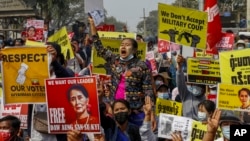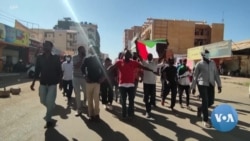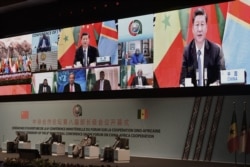Autocratic leaders are facing a democratic backlash from their people in several countries around the world, according to the organization Human Rights Watch in its annual global report, which was published Thursday.
The report said that in the past 12 months there have been a series of military coups and crackdowns on opposition figures.
In Myanmar, the military seized power last February and ousted the democratically elected government, jailing President Win Myint and State Counsellor Aung San Suu Kyi.
In Nicaragua, opposition members were jailed on treason charges ahead of the November election, as President Daniel Ortega consolidated power.
In Uganda, President Yoweri Museveni was re-elected in January 2021 after security forces arrested and beat opposition supporters and journalists, killed protesters, and disrupted opposition rallies.
Democratic Backlash
“The conventional wisdom these days is that autocrats are in the ascendancy and democratic leaders are in the decline, but when we looked back over the last year, we found that that view is actually too superficial, too simplistic,” said Kenneth Roth, the executive director of Human Rights Watch, in an interview with VOA.
In fact, there are encouraging signs of democratic uprisings, Roth said. “There's an emergence of a series of popular demonstrations, popular protests for democracy against the autocrat. And we've seen this in a range of countries: in Thailand, Myanmar and Sudan, in Uganda, Nicaragua, Cuba, Poland, many parts of the world, these outpourings of support for human rights, for democracy, and against autocratic rule.”
Despite the optimistic tone, the report catalogues the suppression of democracy and human rights in more than 100 countries. Tens of thousands of opposition activists, human rights defenders and civilians have been jailed, beaten or killed.
Russia
In Russia, opposition leader Alexey Navalny remains in prison on parole-related violations after surviving a nerve agent attack he blamed on the Kremlin. Russia denied involvement.
“The legislative crackdown that started in November 2020 intensified ahead of the September 2021 general elections,” the Human Rights Watch report says. “Numerous newly adopted laws broadened the authorities’ grounds to target a wide range of independent voices. Authorities used some of these laws and other measures, to smear, harass, and penalize human rights defenders, journalists, independent groups, political adversaries, and even academics. Many left Russia for their own safety or were expelled. Authorities took particular aim at independent journalism.”
Since December 2020, the report says, “the number of individuals and entities (that) authorities branded (as) ‘foreign media—foreign agent’ exploded, reaching 94 by early November. Most are prominent investigative journalists and independent outlets,” the report said.
Human Rights Watch says Moscow continues to suppress democracy at home and lend support to autocrats overseas, including President Alexander Lukashenko in Belarus, who has jailed hundreds of anti-government demonstrators and activists following the 2020 election that critics say was rigged.
Russia earlier this month sent troops to Kazakhstan to help its autocratic president, Kassym-Jomart Tokayev, crush anti-government protests. Russia’s president, Vladimir Putin, continues to offer military support to his Syrian ally, Bashar al-Assad, who is accused of crimes against humanity in his brutal suppression of the 2011 uprising and its aftermath.
China
The report says China has locked up thousands of pro-democracy activists and has intensified its crackdown on democratic freedoms in Hong Kong following the imposition of the National Security Law on the territory.
“With President Xi Jinping at the helm, the Chinese government doubled down on repression inside and outside the country in 2021. Its ‘zero-tolerance’ policy towards COVID-19 strengthened the authorities’ hand, as they imposed harsh policies in the name of public health,” the Human Rights Watch report says.
“Authorities (are) committing crimes against humanity as part of a widespread and systematic attack on Uyghurs and other Turkic Muslims in Xinjiang, including mass detention, torture, and cultural persecution. Tibetans continued to be subjected to grave abuses, including harsh and lengthy imprisonment for exercising their basic rights,” the report adds. China has denied committing abuses in Xinjiang.
Rule by force
Roth says, despite the seemingly overwhelming force wielded by oppressive states, there is cause for hope.
“To maintain power by force is a very short-term strategy. If you look at Myanmar where the junta performed a coup almost a year ago, all they have is force. The entire population is against them. I think in Sudan, the military is facing something similar. They've just ousted the civilian prime minister, but they now face such a hostile population,” Roth told VOA.
Opposition coalitions
The report says that in countries that still permit reasonably fair elections, opposition politicians – and electorates – are getting more sophisticated.
“We’ve seen the emergence in a number of countries that still permit reasonably fair elections of broad political coalitions, alliances for democracy. And we saw these coalitions oust Prime Minister (Andrej) Babiš in the Czech Republic, they got rid of (Benjamin) Netanyahu in Israel, they were really behind the coalition that chose Joe Biden to contest (U.S. President) Donald Trump. And today in Hungary and in Turkey, Prime Minister (Viktor) Orbán and President (Recep Tayyip) Erdogan are facing similar broad coalitions that are really putting their grasp on power in jeopardy,” Roth said.
Democratic duty
Human Rights Watch says the leaders of democratic countries must end their support for autocratic regimes, like Saudi Arabia and Egypt – and they must do a better job of delivering for their own people.
“Particularly today when there really are big global challenges, climate change, the pandemic, poverty and inequality, the threats from technology. These are huge problems that demand visionary leadership,” Roth told VOA.
“But instead, typically we're getting from democratic leaders minimalism, incremental change, really short-term steps, and that's not enough. If that's all that they can come up with, they're going to generate despair and frustration, which are going to be a breeding ground for a second wind for the autocrats.”
The Human Rights Watch report strikes an optimistic tone – but cautions that the “outcome of the battle between autocracy and democracy remains uncertain.”









